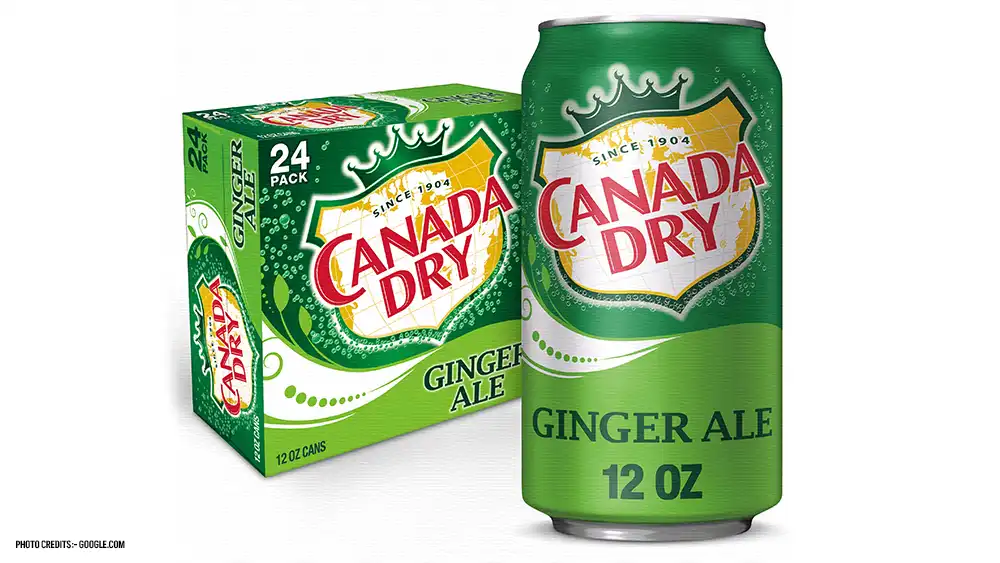
HEALTH BLOG
Does Ginger Ale Have Caffeine? Real Truth in 2024
-
Rahul Priydarss
Discover the truth about ginger ale and caffeine in 2024. Learn why ginger ale is caffeine-free, its ingredients, health benefits, and popular brands like Canada Dry and Schweppes. Whether you enjoy it as a soothing drink or a cocktail mixer, find out everything you need to know about ‘Does Ginger Ale Have Caffeine’.
Introduction of Does Ginger Ale Have Caffeine?:
Ginger ale, a popular carbonated beverage flavored with ginger, has been enjoyed by people worldwide for centuries. Whether served as a refreshing drink on a hot summer day or used as a remedy for an upset stomach, ginger ale holds a unique place in many households. One question often arises about this fizzy drink is whether it contains caffeine. This blog post will explore the ingredients of ginger ale, its history, and its health benefits, and answer the crucial question: does ginger ale have caffeine?
What is Ginger Ale:
Ginger ale is a carbonated soft drink flavored with ginger. It has a sweet and mildly spicy taste and is often consumed on its own or used as a mixer in cocktails and other beverages. There are two main types of ginger ale: golden ginger ale, which has a stronger ginger flavor and darker color, and dry ginger ale, which is lighter in color and has a milder ginger taste. The latter is more commonly found in North America. Ginger ale is also sometimes used as a home remedy for nausea and digestive issues.

Table of Contents
The Origins of Ginger Ale:
The history of ginger ale dates back to the 19th century. The beverage was initially created as a homemade remedy for nausea and digestive issues. Early versions were not carbonated and resembled ginger beer more closely. It wasn’t until the late 1800s that the modern carbonated version of ginger ale we know today began to take shape.
There are two primary types of ginger ale: golden and dry. Golden ginger ale, which has a stronger ginger flavor and a darker color, was the original style. Dry ginger ale, lighter in color and flavor, became popular in the early 20th century and is now the more commonly consumed version. Brands like Canada Dry, Schweppes, and Seagram’s have become household names, each offering their unique take on this classic beverage.
Ingredients of Ginger Ale:
To understand whether ginger ale contains caffeine, it’s essential to look at its ingredients. Traditional ginger ale recipes typically include the following:
Carbonated Water: This is the primary ingredient in ginger ale, providing the fizz and refreshing quality that makes the drink so enjoyable.
Sugar or High-Fructose Corn Syrup: Sweeteners are used to balance the spicy ginger flavor. The amount and type of sweetener can vary by brand.
Ginger Extract or Natural Flavors: Ginger is the star ingredient, giving the beverage its distinctive taste. Some brands use natural ginger extract, while others may use artificial flavors to mimic the ginger taste.
Citric Acid: This is often added to provide a tartness that enhances the overall flavor profile.
Preservatives: Ingredients like sodium benzoate or potassium sorbate are used to extend the shelf life of the product.
Caramel Color: Some ginger ales, especially golden varieties, use caramel color to achieve their characteristic hue.
| Amount Per Serving | Daily Value |
|---|---|
| Calories | 140 |
| Total Fat | 0g – 0% |
| Sodium | 50mg – 2% |
| Carbohydrates | 36g. – 12% |
| Sugar | 33g |
| Protein | 0g |
Note- Not a significant source of calories from fat, saturated fat, trans fat, cholesterol, dietary fiber, vitamin A, vitamin C, calcium and iron.
*Percent Daily Values are based on 2,000 calorie diet.
Ingredients: carbonated water, high fructose corn syrup and less than 2% of: ginger extract, natural flavors, citric acid, sodium benzoate (preservative), caramel color.
Does Ginger Ale Have Caffeine?:
The short answer to the central question is: No, ginger ale does not contain caffeine. Most commercially available ginger ales are caffeine-free. This makes ginger ale a popular choice for individuals who are sensitive to caffeine or are looking to reduce their caffeine intake. Brands such as Canada Dry, Schweppes, and Seagram’s all offer ginger ale varieties that do not contain caffeine.
Why Ginger Ale is Caffeine-Free:
- Ingredients: Traditional ginger ale recipes use carbonated water, ginger flavoring, sugar, and sometimes other natural or artificial flavors. None of these ingredients naturally contain caffeine. Unlike cola or energy drinks, which use caffeine as a stimulant, ginger ale does not include caffeine as part of its formulation.
- Market Demand: Many people seek out caffeine-free beverages for various reasons, including health concerns, dietary restrictions, or personal preference. By keeping ginger ale caffeine-free, manufacturers cater to a wider audience who prefer non-caffeinated drinks.
Popular Brands:
- Canada Dry: Known for its crisp and clean taste, Canada Dry ginger ale is a staple in many households. It proudly labels its products as caffeine-free.
- Schweppes: Another major brand, Schweppes offers a variety of ginger ale options, all of which are caffeine-free.
- Seagram’s: This brand also produces ginger ale without caffeine, making it a reliable choice for those avoiding caffeine.
Always Check the Label: While the vast majority of ginger ales are caffeine-free, it’s always a good idea to check the label of any ginger ale product you purchase. Formulations can vary, especially with specialty or craft ginger ales that might include unique ingredients or variations in their recipes. Even though caffeine is unlikely to be present, confirming through the product label ensures you are fully informed about what you are consuming.

What is Caffeine?:
Caffeine is a natural stimulant found in various plants, including coffee beans, tea leaves, cacao pods (used to make chocolate), and kola nuts. It belongs to a class of compounds called methylxanthines and is known for its stimulating effects on the central nervous system.
Effects of Caffeine: When consumed, caffeine acts as a mild central nervous system stimulant, which can help increase alertness and reduce fatigue. It achieves this by blocking the action of adenosine, a neurotransmitter that promotes relaxation and sleepiness. By inhibiting adenosine, caffeine promotes the release of other neurotransmitters such as dopamine and norepinephrine, which contribute to increased alertness and improved mood.
Sources of Caffeine: Caffeine is commonly consumed in beverages such as coffee, tea, and energy drinks. It is also found in various foods and medications, including chocolate and certain pain relievers. The amount of caffeine in these sources can vary widely, with coffee and energy drinks typically containing higher concentrations compared to tea and chocolate.
Caffeine Content: The caffeine content in beverages can vary based on factors such as the type of bean or leaf used, the brewing method, and serving size. For example, a typical 8-ounce (240-milliliter) cup of brewed coffee contains approximately 80-100 milligrams of caffeine, while the same amount of black tea contains about 30-50 milligrams. Energy drinks can have much higher caffeine concentrations, ranging from 80 milligrams to over 200 milligrams per serving.
Effects of caffeine on the body: Moderate consumption of caffeine (about 200-400 milligrams per day, or roughly 2-4 cups of coffee) is generally considered safe for most adults. Beyond enhancing alertness, caffeine can also temporarily improve cognitive function, physical performance, and endurance. However, excessive consumption can lead to side effects such as insomnia, jitteriness, increased heart rate, and digestive issues.
Health Benefits of Ginger Ale:
Ginger ale isn’t just a tasty beverage; it also offers several potential health benefits, primarily due to its ginger content. Here are some notable benefits.
Digestive Aid: Ginger has long been used to treat nausea and indigestion. Drinking ginger ale can help soothe an upset stomach and relieve nausea, making it a popular choice for those experiencing motion sickness or morning sickness during pregnancy.
Anti-Inflammatory Properties: Ginger contains compounds called gingerols, which have anti-inflammatory and antioxidant effects. These properties can help reduce inflammation in the body and support overall health.
Hydration: While water is the best source of hydration, ginger ale can also contribute to your daily fluid intake. Just be mindful of the sugar content, as consuming too much sugar can have adverse health effects.
Calmative Effects: The carbonation in ginger ale can help relieve bloating and gas, providing comfort after a large meal.
Potential Downsides of Ginger Ale:
While ginger ale has several benefits, it’s also important to be aware of its potential downsides.
High Sugar Content: Many ginger ales contain high levels of sugar or high-fructose corn syrup, which can contribute to weight gain, dental issues, and other health problems if consumed in excess. Opting for diet or low-sugar versions can mitigate this concern.
Artificial Ingredients: Some brands use artificial flavors and colors, which may not be desirable for those looking to consume more natural products. Reading ingredient labels carefully can help you make more informed choices.
Caloric Intake: Like other sugary beverages, ginger ale can add to your daily caloric intake. If you’re watching your weight, it’s essential to consider the calories from beverages as part of your overall diet.
Alternatives to Traditional Ginger Ale:
If you love the taste of ginger but want to avoid the sugar and artificial ingredients found in some ginger ales, there are alternatives you can explore:
Homemade Ginger Ale: Making ginger ale at home allows you to control the ingredients and sweetness level. You can use fresh ginger, carbonated water, and a natural sweetener like honey or agave syrup.
Ginger Tea: For a warm, caffeine-free alternative, ginger tea is an excellent option. You can brew it using fresh ginger slices and enjoy the soothing benefits without any added sugar or preservatives.
Sparkling Water with Ginger: Many brands offer flavored sparkling water, including ginger varieties. These can provide the ginger flavor you love without the added sugars and calories.
The Future of Ginger Ale:
As consumers become more health-conscious, the beverage industry is evolving to meet new demands. There is a growing trend towards natural and organic ingredients, lower sugar content, and more transparency in labeling. Ginger ale is no exception to these trends.
Innovations in ginger ale production include the use of real ginger juice, organic sweeteners, and the elimination of artificial additives. Brands are also exploring unique flavor combinations, such as ginger with citrus or other spices, to appeal to a broader audience. In addition, the rise of craft beverages has led to a resurgence of interest in traditional and artisanal ginger ales. Small-batch producers are experimenting with different ginger varieties and brewing methods, creating high-quality, distinctive products that stand out in the market.
FAQs about Does Ginger Ale Have Caffeine?:
A1: Not all ginger ales contain real ginger. Some brands use artificial flavors to mimic the taste of ginger. Always check the ingredient label if you want a product with genuine ginger content.
A2: Yes, ginger ale can help soothe an upset stomach due to the presence of ginger, which has natural anti-nausea properties. However, be mindful of the sugar content, which might not be ideal if consumed in large quantities.
A3: Absolutely! Ginger ale is a popular mixer in cocktails, adding a refreshing and spicy note to drinks like the Moscow Mule, Whiskey Ginger, and various punches.
A4: Ginger ale is typically sweeter and less spicy than ginger beer. Ginger beer is brewed and fermented, giving it a stronger ginger flavor and a slightly alcoholic content, whereas ginger ale is usually carbonated water with ginger flavoring.
A5: Yes, many brands offer diet or low-sugar versions of ginger ale, which use artificial sweeteners or less sugar to reduce calorie content.

-Please remember, to always consult with healthcare professionals or Doctors for personalised advice related to medical conditions.
Conclusion:
In conclusion, the question “Does Ginger Ale Have Caffeine?” is definitively answered: No, ginger ale does not contain caffeine, making it a favored choice for those seeking a caffeine-free beverage. This exploration of ginger ale’s ingredients, history, and health benefits underscores its appeal as a soothing and flavorful drink, whether enjoyed alone or as a mixer. With its origins rooted in remedies for nausea and digestive discomfort, ginger ale continues to evolve, adapting to consumer preferences for natural ingredients and reduced sugar content. As the beverage landscape shifts towards healthier options, ginger ale remains a timeless classic, offering refreshments without the buzz of caffeine.




